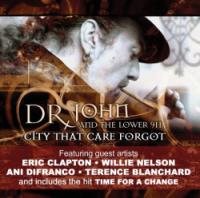A Big Mac Attack!
Mac “Dr. John” Rebenack’s soulful plea for the resurrection of his beloved New Orleans comes on funky and optimistic on the opener “Keep on Goin’,” but on the next tune, “Time For A Change,” with Eric Clapton, Rebenack’s showing a little fed-upedness with lines like “Stop the money made at the cost of life.”
By the third song, “Promises, Promises,” a sloppy but spirited gospel tinged duet with Willie Nelson, which opens with the line “The road to the White House is paved with lies,” you get the idea that “Heckuva job Brownie” didn’t sit well with the Doc.
Dr. John mixes sadness, anger, bitterness and optimism in this sweaty, reflective set that pushes his fellow NOLA citizens forward while acknowledging the pain and loss created in the wake of Hurricane Katrina.
It’s Rebenack’s darkest, most inspired work in years, one that reconnects him with the swamp mystery of his early albums, minus the novelty artifacts that gave those efforts a mischievous, humorous edge.
This album’s got a grim, purposeful feel, leavened on a bed of deep, furious funk. Mac sings about the second battle of New Orleans, of sleeping with his sword and being the samuri in the “holy lost cause of the river and the bayou and the fishing holes.”
He sings about oil as in oil wars and drilling offshore, of votes not counted and veterans treated like thugs. He’s not pulling punches as he sings about the “City That Care Forget,” and about the biggest “Land Grab” since Columbus.
On (if you wonder how we doin’) “We Gettin’ There,” featuring Terence Blanchard’s bitter but not angry trumpet accompaniment, Mac sings about the ongoing rebuilding hardships as only someone immersed in the struggle might.
He sings of the New Orleans he loved (“loud, ratty, free and easy fonk”) that was “Stripped Away,” and makes a plea to “Save Our Wetlands.”
The corrosive bile spills on the bitter, powerful “Say Whut?” that Rebenack spits as much as sings, opening with “They tell me ‘forgive’ they tell me ‘forget’/Ain’t nobody charged for the murders yet.”
That’s followed with the albums’ standout tune (in an album filled with them), the heartbreaking plea, “My People Need A Second Line.” The “second line” is what they call the musical group accompanying a funeral procession in New Orleans that plays a joyful sendoff for the deceased. The song is about a musician shortage in the wake of Katrina that doesn’t allow for processions to accompany every funeral for which one is wanted. The song ends with a brass-filled “second line.”
City That Care Forgot is a deep, moving, thoughtful album that’s as funky and entertaining as it is meaningful. It’s the story of what New Orleans has been going through in the wake of the hurricane told with the compassion and gravity only a Crescent City native could bring to it.
The sound is extremely well done on this double LP recorded at Dockside Studios in Louisiana, which has 2 Studer A-820 24 track analog recorders and an Ampex ATR 102 2 track mix down deck. Were they used or was this done on ProTools for budgetary reasons? I don’t know. However it was done, the sound is really clean, well organized and not at all “smashed” sounding.
City That Care Forgot is a meaningful, historic effort that’s highly recommended. It’s one of Dr. John’s finest, most heartfelt efforts. You’ll come away moved and if it affects you as it does me, return to it often not for its bitterness and resentment (though I love those!) but for its remarkable expression of the resiliency of the human spirit.
Of course be sure to read Roger Hahn's exceptional coverage of New Orleans in the wake of Katrina in the "Features" section of this website.




